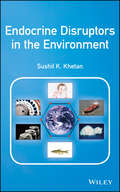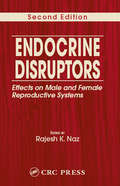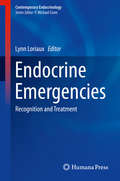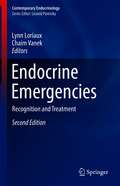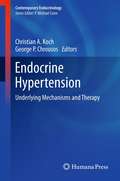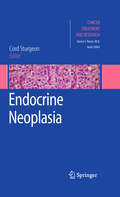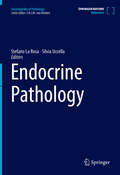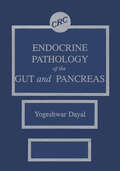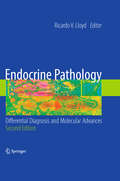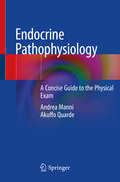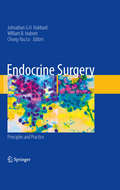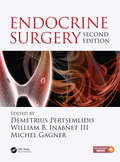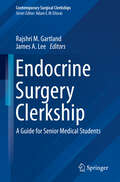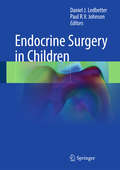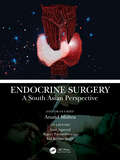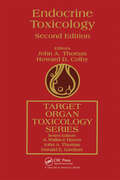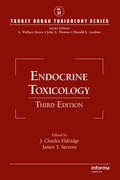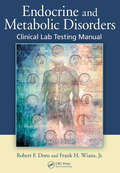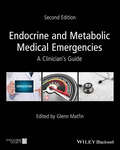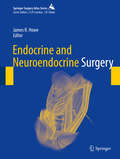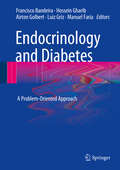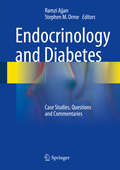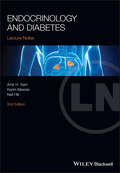- Table View
- List View
Endocrine Disruptors in the Environment
by Sushil K. KhetanThe book is divided in three parts and 14 chapters. An introductory chapter provides an overview of endocrine system, and endocrine disruptors, discussing their salient features and presenting a historical perspective of endocrine disruption phenomena. The first part includes seven chapters that cover hormone-signalling mechanisms, followed by various broad classes of putative endocrine disruptors and an introduction to environmental epigenetic modifications. The second part in two chapters focuses on removal processes of various EDCs by biotic and abiotic transformation/ degradation. The third and final part consists of four chapters, embracing themes on finding solutions to environmental EDCs including their detection, regulation, replacement and remediation.
Endocrine Disruptors: Effects on Male and Female Reproductive Systems, Second Edition
by Rajesh K. NazThere is great concern regarding the reproductive and health hazards of endocrine disruptors. Research indicates that men are experiencing declining fertility and an increased incidence of prostate cancer, while women are dealing with increased infertility, early menopause, and breast cancer. As new research reveals the previously unknown risks of
Endocrine Emergencies
by Lynn LoriauxEndocrine Emergencies: Recognition and Treatment offers a state-of-the-art update on the management of endocrine, diabetic, and metabolic emergencies. Developed by renowned experts, this comprehensive and easy to read title brings the field fully up to date, setting a high standard for diagnosis and treatment in each category. All chapters begin with a summary that presents, in concentrated form, what the physician needs to know to begin the evaluation and emergency treatment of the known endocrine emergencies. This is followed by an extended discussion of the pathophysiology that can be read after initial treatment has begun. Covering such areas as hypoglycemia, acute adrenal insufficiency, ovarian hyperstimulation syndrome, thyroid storm, and pituitary apoplexy, just to name several, Endocrine Emergencies: Recognition and Treatment is an invaluable, practical resource that will be of great interest to endocrinologists, internal medicine and emergency room physicians, fellows and residents.
Endocrine Emergencies: Recognition and Treatment (Contemporary Endocrinology #74)
by Lynn Loriaux Chaim VanekMedical emergencies due to disorders of the endocrine system represent a unique category of clinical care. Hypotension, fever, palpitations, confusion, and electrolyte abnormalities are all signs of disparate endocrine emergencies that require immediate diagnoses and treatment. Recognition of endocrine emergencies will frequently lead to rapid improvement and stabilization of the patient.Now in a revised and expanded second edition including the latest clinical guidelines and protocols, Endocrine Emergencies serves as a handy single reference for any endocrinologist, internist, hospitalist, and emergency medicine physician to rapidly identify and initiate treatment. Topics covered include acute adrenal insufficiency, diabetic ketoacidosis, thyroid storm, hyponatremia, and myxedema coma, among many others. Each chapter opens with a precis that provides, in a single page, a presentation of symptoms, workup, and therapy. This serves as a rapid, “off the shelf” cue to immediately begin a differential diagnoses and therapy plan. The remainder of each chapter is an in-depth review of the pathophysiology, diagnoses, and management of the disease process. Book chapters are written by experts in the field and reflect the consensus and standard of care for specific endocrine emergencies.Updated with the latest clinical evidence and treatment options, Endocrine Emergencies remains a valuable resource for practitioners in endocrinology and internal medicine, as well as emergency room physicians, hospital support staff, fellows and residents.
Endocrine Hypertension
by Christian A Koch George P ChrousosThe prevalence of hypertension is almost three times as high as that of diabetes mellitus type 2, with both conditions being major risk factors for stroke, ischemic heart disease, cardiac arrhythmias, and heart failure. The exact prevalence of hypertension related to hormonal derangements (endocrine hypertension) is not known but estimated to affect less than 15% of hypertensive patients. Recent scientific discoveries have increased the understanding of the pathophysiologic mechanisms of hypertension. In Endocrine Hypertension, a renowned panel of experts provides a comprehensive, state-of-the-art overview of this disorder, discussing when to assign an endocrine cause in one of many conditions that may present with hypertension. The first part of Endocrine Hypertension is dedicated to adrenal causes. The second part of the volume concerns potential nonadrenal causes of hypertension, such as growth hormone excess or deficiency, primary hyperparathyroidism, vitamin D deficiency, testosterone deficiency, insulin resistance, obesity-associated hypertension, and the role of central mineralocorticoid receptors and cardiovascular disease. An important contribution to the literature, Endocrine Hypertension is an indispensable reference not only for endocrinologists, diabetologists, and adrenal investigators, but also for translational scientists and clinicians from cardiology, internal medicine, pediatrics, family medicine, geriatrics, urology, and reproductive medicine / gynecology.
Endocrine Neoplasia
by Cord SturgeonEndocrine Neoplasia is a comprehensive, updated, and clearly-written text covering the diseases for which endocrine surgical expertise is often needed. We look towards advances in the science and the art of endocrine surgery to continuously improve outcomes for our patients. The goal of this text was to provide a detailed description of both the underlying science of disease as well as the art of clinical management. The book is divided into five sections addressing neoplasms of the thyroid, parathyroid, adrenal gland, neuroendocrine pancreas, and multiple endocrine neoplasia. Experts from the United States, Canada, and Australia have contributed chapters addressing both the biology of endocrine tumors and the clinical management of disease. Recent discoveries regarding the genetic underpinnings of disease are highlighted. Updated consensus guidelines were used for clinical recommendations. The management of complex and often confusing clinical problems is discussed in detail.
Endocrine Pathology (Encyclopedia of Pathology)
by Stefano La Rosa Silvia UccellaThis encyclopedia volume covers the complete field of endocrine pathology – from Acidophil Stem Cell Adenoma to Waterhouse-Friderichsen syndrome. The alphabetically arranged entries, each of which provides a detailed description of a specific pathological disease pattern, allow readers to quickly and easily find the information they need.
Endocrine Pathology of the Gut and Pancreas
by Yogeshwar DayalThis important new book presents critical information on the clinical and morphological aspects of various endocrinological disorders of the gut and pancreas. Topics include a historical perspective and broad overview of the neuroendocrine component of the gut; hyperplastic proliferations of gastrointestinal endocrine cells; pancreatic endocrine cells and their non-neoplastic proliferations; tumors and lesions; and endocrine differentiation in nonendocrine tumors. The book stresses clinical and pathological aspects of these topics, as well as the pathogenesis, clinicopathological correlations, and diagnostic approaches. Gastroenterologists, pathologists, internists, surgeons, endocrinologists and others interested in endocrinological disorders of the gut and pancreas will discover that this book will be a welcome addition to your reference library.
Endocrine Pathology:
by Ricardo V. LloydEndocrine Pathology: Differential Diagnosis and Molecular Advances, Second Edition provides detailed coverage of endocrine pathology with extensive discussion of the differential diagnosis as well as presentation of molecular pathobiology of the major endocrine organs. Revised and expanded from the first edition, each chapter, written by leaders in their respective field, has been updated with the latest advances that are transforming the field of endocrine pathology. Richly illustrated with color photomicrographs, useful diagrams and line drawings, each chapter includes differential diagnosis of common and uncommon lesions as well as material on molecular developments, with emphasis on the molecular findings that are most helpful in the diagnosis of specific disorders. Endocrine Pathology: Differential Diagnosis and Molecular Advances, Second Edition, provides a useful and well-organized resource designed not only for the endocrine pathologist and the general surgical pathologist, but also for the clinical endocrinologist and the endocrine surgeon.
Endocrine Pathophysiology: A Concise Guide to the Physical Exam
by Andrea Manni Akuffo QuardeThis practical guide presents a concise approach to exploring endocrine pathophysiology through the physical exam, emphasizing common clinical signs in endocrinology that can be elicited through inspection, palpation, percussion or auscultation. The established and proposed mechanisms underlying these physical signs are highlighted, allowing students, residents and trainees to better appreciate endocrine pathophysiology at the bedside. The text is organized sensibly to facilitate quick and efficient review by medical trainees. Major diseases in endocrinology are grouped by organ systems - pituitary, thyroid, adrenal, and so on. Specific physical examination findings in each primary endocrine disease are reviewed and grouped under the categories of clinical features and pathophysiology, followed by related clinical and pathophysiology pearls. A brief description of the clinical finding is followed by a summary of the pathophysiologic mechanisms underlying the stated clinical finding. Relevant normal physiology and pathophysiology are reviewed where applicable, to facilitate learning. There are numerous texts on the pathophysiologic basis of diagnostic and laboratory findings in endocrinology. There is, however, no dedicated text to address questions that might be asked by trainees. Endocrine Pathophysiology satisfies this need in the literature.
Endocrine Surgery
by Chung-Yau Lo William B. Inabnet Johnathan HubbardThere has been a recent surge of interest within the world of endocrine surgery in the US and worldwide with resultant significant changes on the way surgery is performed. Where before a 5-7 year period was taken for a general surgeon, after which the medic would take a 1 year residency then a fellowship, now they are looking at 3 years core surgery and then going straight to specialise, opening up the discipline to more people. The book is a valuable tool for those revising for board examinations and Fellowship examinations. The text, compiled by expert authors from the USA, Europe and Asia, provides an international perspective on the basic knowledge and clinical management.
Endocrine Surgery
by William B. Inabnet III Demetrius Pertsemlidis Michel GagnerThe second edition of Endocrine Surgery is a comprehensive update of the previous edition published in 2003. Edited by three leading authorities in the field of surgical endocrinology, the book encompasses the clinical, imaging, nuclear, molecular, technological and evidence-based principles that are applied in the diagnosis and treatment of all categories of endocrine tumors. Authored by experts from across the globe, this textbook reflects the best international clinical practice and also provides an outstanding educational resource. <P><P>With full color illustrations throughout, the new edition emphasizes contemporary approaches in successive stages including: pituitary endocrine tumors; pathology and pathophysiology of pulmonary neuroendocrine cells; surgery of endocrine tumors of the lungs and thymus; robotic endocrine surgery; molecular testing of thyroid nodules; pediatric surgery for neuroblastoma and ganglioneuroma; multiple endocrine neoplasia; retroperitoneoscopic adrenalectomy; radionuclide imaging of carcinoid tumors, pancreas and adrenals; serotonin-induced cardiac valvular disease and surgical treatment; multimodal management of primary and metastatic neuroendocrine tumors; pathophysiology and surgery of Type II diabetes; post-bariatric surgery hyperinsulinemic hypoglycemia; and surgical management of metabolic syndrome. <P><P>Endocrine Surgery 2e provides the clinician with a definitive resource to reach curative outcomes in the treatment of patients with endocrine pituitary, thyroid, and parathyroid entities. Further coverage of broncho-pulmonary, adrenal, pancreatic, and intestinal neoplasia is also included, making this the definitive textbook on the subject. <P><P> Demetrius Pertsemlidis, MD FACS The Bradley H. Jack Professor of Surgery, Icahn School of Medicine at Mount Sinai, New York, USA <P><P>William B. Inabnet III, MD FACS Professor of Surgery and Chief, Division of Metabolic, Endocrine and Minimally Invasive Surgery, Icahn School of Medicine at Mount Sinai, New York, USA <P><P>Michel Gagner, M.D. FRCSC, FACS, FASMBS Clinical Professor of surgery, Herbert Wertheim School of Medicine, Florida International University, Miami, FL and Senior consultant, Hôpital du Sacre Coeur, Montreal, Quebec, Canada <P><P>Print Versions of this book also include access to the ebook version.
Endocrine Surgery Clerkship: A Guide for Senior Medical Students (Contemporary Surgical Clerkships)
by James A. Lee Rajshri M. GartlandThis quick-reference guide is the first book written specifically for the many third- and fourth-year medical students rotating on an endocrine surgery service. Each chapter covers history, physical examination, imaging, and common diagnoses. For each diagnosis, the book sets out the typical presentation, options for non-operative and operative management, and expected outcomes. Chapters include key illustrations, quick-reference charts, tables, diagrams, and bulleted lists. Students can read the text from cover to cover to gain a general foundation of knowledge that can be built upon when they begin their rotation, then use specific chapters to review relevant content before seeing patients in clinic or in the operating room. Topics covered include diagnosis and management of thyroid, parathyroid, and adrenal disorders, gastrointestinal neuroendocrine tumors, and much more. Practical and user-friendly, Endocrine Surgery Clerkship is the ideal, on-the-spot resource for medical students and practitioners seeking fast facts on diagnosis and management. Its bullet-pointed outline format makes it optimal for quick reference, and its content breadth covers the most commonly encountered problems in clinical practice.
Endocrine Surgery Comprehensive Board Exam Guide
by Gregory W. Randolph Alexander L. Shifrin Marco Raffaelli Oliver GimmEvery surgical subspecialty has been rapidly developing with establishment of the board certification. The Division of Endocrine Surgery (DES) of the European Board of Surgery has defined the curriculum for Endocrine Surgery to include thyroid, parathyroid, adrenal and GEP-NET surgery, and handles accreditation in Endocrine Surgery. The first examinations in Endocrine Surgery in Europe have been introduced in 2003. The main goal of the exam is to maintain a uniform and high standard of endocrine surgical professionalism across the Europe.This book was completed with the expectation that it would benefit all European surgeons looking to be certified in Endocrine Surgery. Additionally, surgeons from the United States and other non-EU countries we hope will also benefit from this book. There is a need for a specialized book that reviews evidence based endocrine surgery that aligns itself with current curriculum standards in the field. The book contains knowledge that is expected to be known on the board examination of the DES. In general, chapters start with a patient’s case followed by questions. The subsequent comprehensive yet concise main text provides all the information needed for a successful DES exam and cites important references. After the patient case and questions, the text goes on to define the condition, the standard of care approach to establish the diagnosis, perform diagnostic tests of choice, review evidence-based treatment options including medical therapy, preparation for surgery. The chapters conclude with follow up care and long term outcomes. The topics discussed within this book closely follow the curriculum of the European Board of Surgery Examination.Written by experts in the field, Endocrine Surgery Comprehensive Board Exam Guide is a valuable source of preparation for the Endocrine Surgery examination and brings Endocrine Surgery to a higher level of expertise by helping to raise the standard of training for future endocrine surgeons.
Endocrine Surgery in Children
by Daniel J. Ledbetter Paul R.V. JohnsonThis book provides in-depth practical advice on how to manage children with endocrine conditions that may benefit from surgery. It is more detailed than general pediatric surgery texts and more surgically oriented than endocrinology texts. The first section is devoted to the thyroid and parathyroid, with detailed discussion of thyroid nodules, thyroid cancer, hyperthyroidism, hyperparathyroidism, and multiple endocrine neoplasia. The second section on the pancreas focuses on nesidioblastosis, islet cell transplantation, the surgical treatment of diabetes, and surgical complications of diabetes. Adrenal disorders are then discussed, followed by a section on the evaluation and management of ovarian and testicular torsion and tumors. The closing section addresses miscellaneous topics such as gynecomastia in boys and growth restriction surgery. This book will serve as an invaluable reference for all practitioners and trainees who care for children with endocrine problems for which surgery is considered.
Endocrine Surgery: A South Asian Perspective
by Amit Agarwal Rajeev Parameswaran Anand Kumar Mishra Kul Ranjan SinghThis comprehensive book on Endocrine Surgery covers disorders of thyroid, parathyroid, adrenal glands along with neuroendocrine tumors of pancreas and gastrointestinal tract. It is a comprehensive, up-to-date treatise covering embryology, anatomy, etiology, clinical manifestations, diagnoses, and treatment modalities of surgical endocrine diseases. The authors explore the pertinent surgical endocrinology topics with a South Asian perspective. Color illustrations, flowcharts and tables make the topics lucid for professionals. This book provides the essential information surgeons require for evaluation and management of patients, both with straight forward, and complex endocrine problems. Key Features Focusses on concise yet comprehensive, up-to-date coverage of surgical endocrine diseases Discusses Robot Assisted Endocrine Surgery and explores its impact on healthcare finances Highlights the difference between practices used in western and resource limited countries by incorporating a South Asian perspective for region specific diseases.
Endocrine Toxicology (Target Organ Toxicology Series)
by John A. Thomas Howard D. ColbyThis text presents a range of topics from the molecular events surrounding hormone actions to epidemiologic studies of the effects of environmental and occupational chemicals on reproductive organs. The endocrine systems covered include the adrenal cortex, thyroid and parathyroid, gonads, and the endocrine pancreas. Of particular importance are the
Endocrine Toxicology (Target Organ Toxicology Series)
by J. Charles Eldridge James T. StevensWith contributions by international experts in academia, chemical manufacturing, government research laboratories, regulatory agencies, and private consulting, this guide explores the potentially damaging influence of environmental agents on the endocrine system. It examines endocrine toxicology's increased importance in environmental safety issues
Endocrine and Metabolic Disorders: Clinical Lab Testing Manual, Fourth Edition
by Robert F. Dons Frank H. Wians Jr.Bottom Line Information to Effectively Diagnose DisordersThe diagnosis, management, and clinical testing associated with old, traditional, and new endocrine disorders have seen numerous advances during the past 10 years since the publication of the previous edition of this bestselling resource. Updating its classic predecessor in content and format
Endocrine and Metabolic Medical Emergencies: A Clinician's Guide (Wiley-Endocrine Society)
by Glenn MatfinThe Essential Guide to Recognizing and Treating Acute Endocrine and Metabolic Illness Endocrinology covers some of the most common conditions and serious public health challenges facing medicine today, and endocrine and metabolic emergencies constitute a large proportion of the clinical workload. Endocrine and Metabolic Medical Emergencies: A Clinician’s Guide provides a singular reference to help endocrinologists, acute and general medicine clinicians, hospitalists and critical care physicians, and general practitioners recognize the symptoms of endocrine emergencies and provide the highest standards of care. Already the definitive and most comprehensive guide to endocrine emergency care, this new second edition: provides acute care guidance for a range of both common and unusual endocrine emergencies; details the effects of acute medical and critical illness on metabolic and endocrine systems, and their impacts on endocrine investigations; discusses special patient populations, including the impacts of aging, pregnancy, transplantation, late-effects, perioperative, inherited metabolic disorders and HIV/AIDS on presentation and management; and features detailed coverage of disorders by system, as well as, metabolic bone diseases, neuroendocrine tumors, and more. Packed with case studies, images, and chapters written by distinguished authors, this guide is designed for both quick reference and study. Coverage includes the presentation, diagnosis, management, and treatment of endocrine and metabolic disorders in an acute care setting, as well as the most up-to-date guidance on issues including clinical lipidology, glucose, sodium, calcium and phosphate, and more. Blending the latest science with clinical and practical advice, this invaluable resource helps clinicians stay up to date with the field’s relevant body of knowledge while providing the practical, clinical insight they need in order to provide their patients with the utmost level of care.
Endocrine and Neuroendocrine Mechanisms Of Aging (CRC Press Revivals)
by Richard C. Adelman George S. RothIt is the purpose of this volume to present a representative sampling of those neural and hormonal studies which have been the focus of the most intense interest in the recent gerontological research. To this end we have been fortunate to enlist the aid of some of the most competent and innovative investigators in the field. More than this, however, an attempt has been made to provide detailed methodological as well as theoretical evaluation for the areas considered. It is our hope that those researchers interested in this area of regulation during aging will be able to utilize the information contained herein as a basis both for critical analysis as well as for the designing and execution of further experiments in this more important area.
Endocrine and Neuroendocrine Surgery
by James R. HoweThis book brings together recognized experts in the field to describe their current techniques for the surgical treatment of diseased thyroid, parathyroid, and adrenal glands, as well as neuroendocrine tumors of small bowel, pancreas, liver, and skin. For each procedure, indications, operative steps, potential pitfalls and complications, and postoperative management are presented. The clear descriptions coupled with informative and beautiful illustrations will give the reader new perspectives and insights into the anatomy and conduct of these procedures.Endocrine surgery has been an area of special interest to surgeons for well over a century, while the increasing incidence of neuroendocrine tumors has more recently led to greater attention to these neoplasms. Significant advances have been made in a variety of areas, the most recent being the introduction of minimally invasive methods of removing diseased glands, and the improved understanding of the natural history of neuroendocrine tumors.
Endocrinology and Diabetes
by Francisco Bandeira Hossein Gharib Airton Golbert Luiz Griz Manuel FariaEndocrinology, and diabetes care in particular, is a dynamic field where clinicians must translate new evidence into clinical practice at a rapid pace. Designed in an engaging, case-based format, Endocrinology and Diabetes: A Problem Oriented Approach offers a wide range of thought-provoking case studies that reflect contemporary, challenging, hands-on clinical care. Further, by providing a list of specific clinical problems, this format offers the reader a more convenient and pointed way to solve precise clinical problems in a timely manner. Developed by a renowned, international group of experts, this comprehensive title covers the most common clinical problems in endocrinology and diabetes and should be of great interest to endocrinologists, diabetologists, internal medicine physicians, family physicians, fellows, and residents.
Endocrinology and Diabetes
by Ramzi Ajjan Stephen M. OrmeThis book provides case studies accompanied by questions and commentaries for the specialist registrar in diabetes and endocrinology, to assist with problem-based learning during their training. The case studies range from the everyday to the rare and complicated, presenting a strong foundation for the specialist trainee to prepare them for their qualifying exams and, more importantly, for their future clinical consultations.
Endocrinology and Diabetes (Lecture Notes)
by Amir H. Sam Karim Meeran Neil HillENDOCRINOLOGY AND DIABETES Lecture Notes 2nd Edition Balancing depth and accessibility, Endocrinology and Diabetes: Lecture Notes, 2nd Edition, provides medical students and junior doctors with the key information needed to understand mechanisms of endocrine conditions. This popular revision guide covers endocrine anatomy and physiology, scientific background, clinical presentations, diagnosis and management of various endocrine disorders. Clear and concise chapters focus on conditions commonly encountered in both clinical practice and assessments. Now in full colour, the second edition has been updated with further figures that demonstrate features of endocrine conditions. Features enhanced and expanded coverage of all major topics within diabetes and endocrinology Reflects the current knowledge base, evidence, and best practices in the field Provides easy access to the scientific background, presentation, diagnosis, and management of each condition Offers up-to-date information for those preparing for MRCP or endocrinology specialty exams Includes boxed sections in every chapter highlighting key points to aid revision and recall Endocrinology and Diabetes: Lecture Notes, 2nd Edition, remains a must-have for medical students, specialist nurses, junior doctors, and trainees working on endocrinology rotations or preparing for the Specialty Certificate Examination in Endocrinology. For more information on the complete range of Wiley medical student and junior doctor publishing, please visit: www.wiley.com To receive automatic updates on Wiley books and journals, join our email list. Sign up today at www.wiley.com/email This new edition is also available as an e-book. For more details, please see http://www.wiley.com/buy/9781118682241 All content reviewed by students for students Wiley Medical Education books are designed exactly for their intended audience. All of our books are developed in collaboration with students. This means that our books are always published with you, the student, in mind. If you would like to be one of our student reviewers, go to www.reviewmedicalbooks.com to find out more.
